Hers was the face that changed the way the Hindi film heroine looked. She came in like a dewy breeze, fresh as her newly-washed tresses, left loose and languid. Not above five feet, her simplicity and formidable talent made her tower over heroines who relied more on mascara, hairpieces and glycerine. Cotton sarees with the pallu wrapped modestly around her, she proved that romance didn’t need familiarity. It could be conveyed with a gesture and a glance. Between 1971-75, she gave back-to-back hits, sweeping nominations and awards. The audiences could connect with her unrehearsed spontaneity; she seemed their regular neighbourhood girl. And the girls, they were freed from the burden of having to look beautiful. They could just be! Celebrating the actor who was as much about giggles as she was about grit...
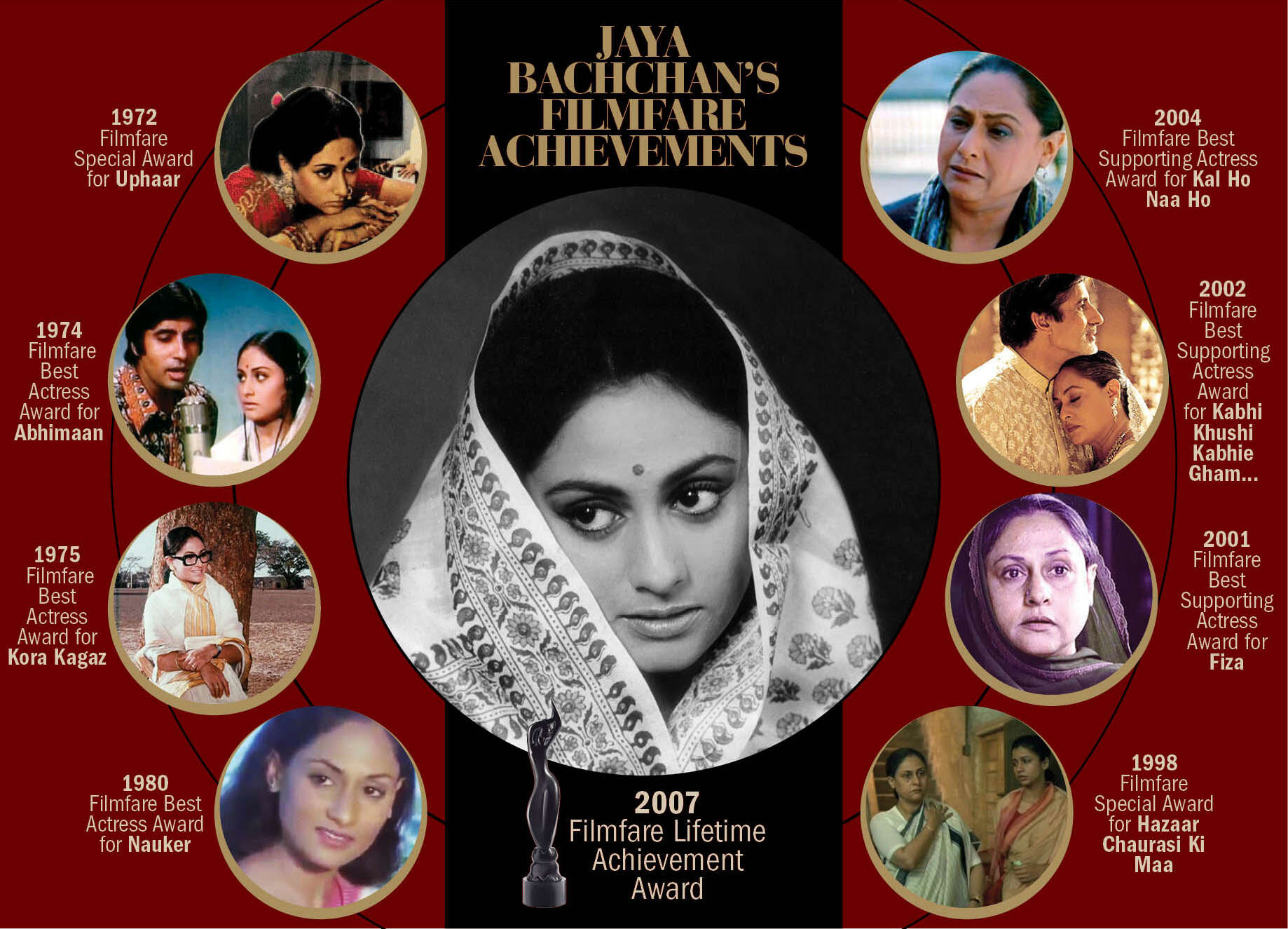
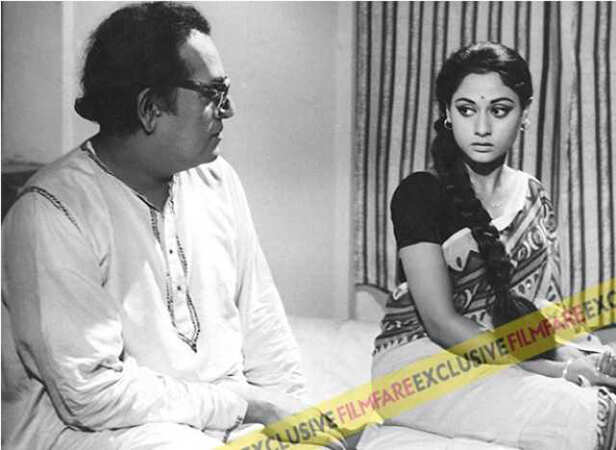
Guddi (1971)
It was impossible to believe that she was not a 14-year-old schoolgirl and that Hrishikesh Mukherjee’s Guddi was a gold medallist from the FTII. The double plaits tightly ribboned, the pleated uniform and eyes brimming with infatuation for film star Dharmendra (he played himself), Jaya Bhaduri made a million teenage girls across the nation identify with her adolescent ardour. Jaya’s Kusum balanced the world of books with an inner world in the throes of an emotional somersault. The denouement, which had Jaya pining for her rejected suitor (played by Samit Bhanja), singing the classic Aaja re pardesi (Madhumati) was all about the coming of age of the giggly Kusum.
The Gulzar written bhajan Hum ko man ki shakti dena, filmed on Jaya become a school anthem of sorts and was the most-oft aired song on Doordarshan’s Chayageet. Singer Vani Jairam’s classical strains and Jaya’s newfound coyness gave Bole re papihara its romantic energy. The film kickstarted Jaya’s innings with director Hrishikesh Mukherjee. The duo went on to celebrate the middle-class in films including Bawarchi, Chupke Chupke, Abhimaan and Mili.
Received a Filmfare nomination for Best Actress
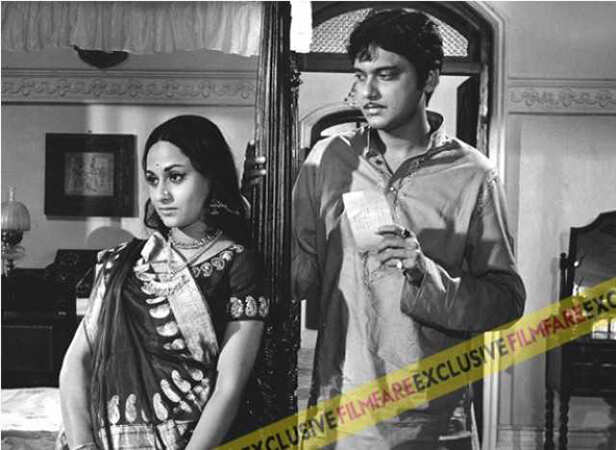
Uphaar (1971)
Directed by Sudhendu Roy the film was based on Rabindranath Tagore’s short story Samapti (The End). Here too, Jaya was paired opposite a lesser known Swarup Dutt. The Rajshri production set in verdant Bengal told the story of Minoo, a child woman, who’d rather pluck mangoes and play with children than hone her womanly charms. Enamoured by her naiveté, Anoop (Swarup), a law student, makes her his bride only to realise that he’s actually ‘cradle snatched’. Dejected he leaves her behind in the village. But Minoo begins missing him. The transition from the puckish girl to the yearning woman was well portrayed by Jaya. The song Main ek raja hoon sung by the hero for his unmindful bride and Sooni re nagariya filmed on Jaya, weighed down by her finery and lament, graphed her character’s changeover. Her subsequent films Basu Chatterjee’s Piya Ka Ghar and Asit Sen’s Annadata further endorsed her talent.
Received a Filmfare nomination for Best Actress
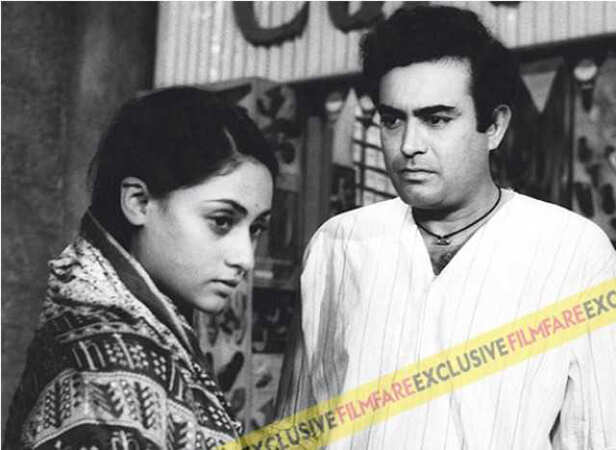
Koshish (1972)
The Gulzar directed and Romu-Raj Sippy produced film traced the romance between a deaf and mute couple and their struggle to live with dignity. For Jaya it marked a departure from her giggles and demanded gravity. Face scrubbed clean of make-up, cotton sarees, hair tightly plaited, yet eyes fluid with hope and dreams… that was Aarti in Koshish. From a girl in love, to a sympathetic wife and an anxious mother, Jaya conveyed all this through sign language. Scenes to watch out for: when she accepts Hari’s (Sanjeev Kumar) ring, when their child is dancing to music and the parents touch the radio speakers to feel the rhythm, when she impersonates how she’d be as an old woman and when Aarti and Hari describe the sunset to a blind friend.
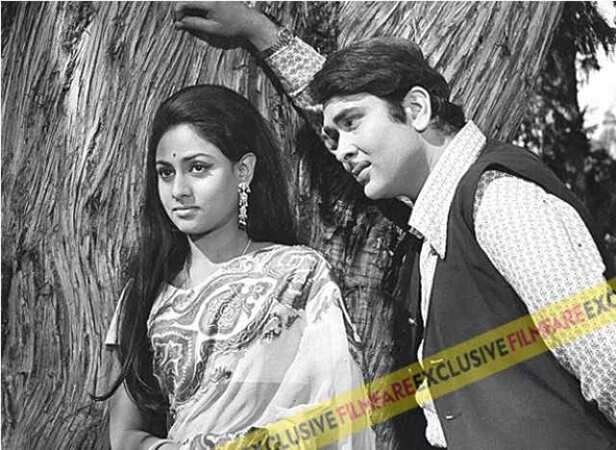
Jawani Diwani (1972)
Directed by Narendra Bedi and produced by Ramesh Behl, this was a campus romance set against the backdrop of a family feud. Jaya was paired opposite Randhir Kapoor. The film presented her in a doll-like avtaar. She even moved around with a doll in the film. Hair kept shoulder length and straight, donning pants and sarees without the patent pallu around her shoulders, this was as modern as she could get. The film is most remembered for its music by RD Burman (remixes of these are regularly doled out). Jaan-e-jaan dhoondhta phir raha not only was a Binaca Geetmala superhit but was also a favourite with the MTV generation. It was to Jaya’s credit that she infused the teasing Abhi nahin abhi karo intezar with characteristic impishness.
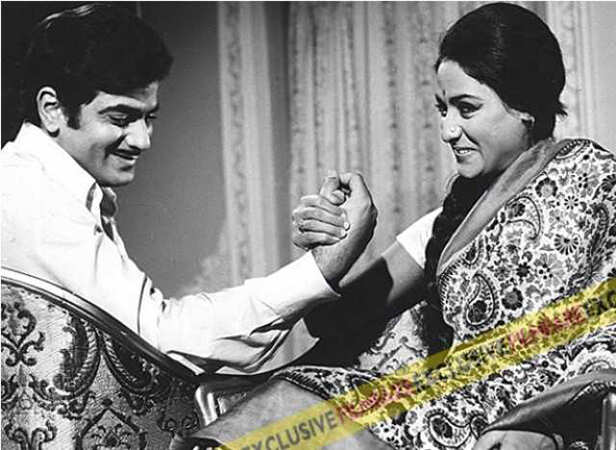
Parichay (1972)
Directed by Gulzar, the movie was inspired by The Sound of Music. Jaya played the protective Rama didi to her bratty siblings, whom teacher Jeetendra had to tame and train. As Rama, her portrayal was peppered with angst and affection. Angst against her grandfather Pran whom she holds responsible for her father’s (Sanjeev Kumar) death and affection for her orphaned siblings! Her relationship with Jeetendra unfolds gently as she lets go of her rancorous side to reveal the romantic. Her synergy with Sanjeev Kumar who played her dad was sensitive. Beeti na beetayi raina not only remains a favourite in music shows, it’s also an emotional sonata. The song Sare ke sare gama ko lekar gaate chale was popular with children.
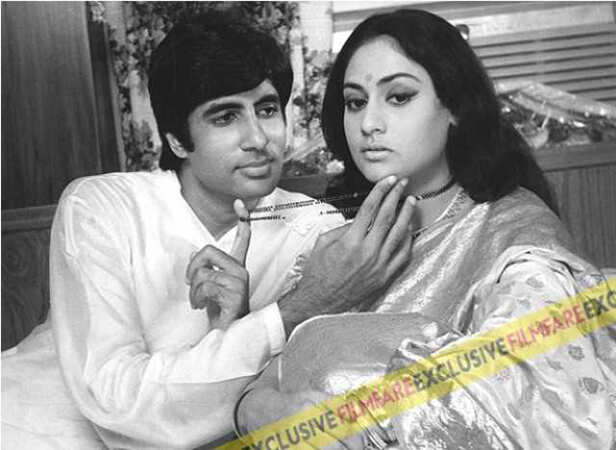
Abhimaan (1973)
Though Jaya had paired opposite Amitabh Bachchan in Bansi Birju and Ek Nazar in 1972 (they were apparently dating then) their pairing hadn’t won box office approval. Yes, her pairing with him in Zanjeer (1973), did hurl his career forward. But it was Hrishida’s Abhimaan that affirmed the duo as a romantic pair, given their terrific tuning. Her character Uma traverses the entire spectrum – from a pastoral girl reveling in music, a new bride blushing with dreams, a singer whose talent hushes her singer husband’s career to a devastated mother who has lost her unborn child. The film is also remembered for SD Burman’s classical score. Teri bindiya re, Loote koi man ka nagar, Piya bina… The song Tere mere milan ki yeh raina was filmed after their marriage. Amitabh placing his hands around her shoulders as the film draws to an end, only marked a beginning… of several more movies together. Somewhere Majrooh Sultanpuri’s lyrics Ab to hai tum se har khushi apni became an oracle! Of Jaya’s subsequent life and times with husband and superstar Amitabh Bachchan.
Won the Filmfare Best Actress Award with Dimple Kapadia (Bobby)
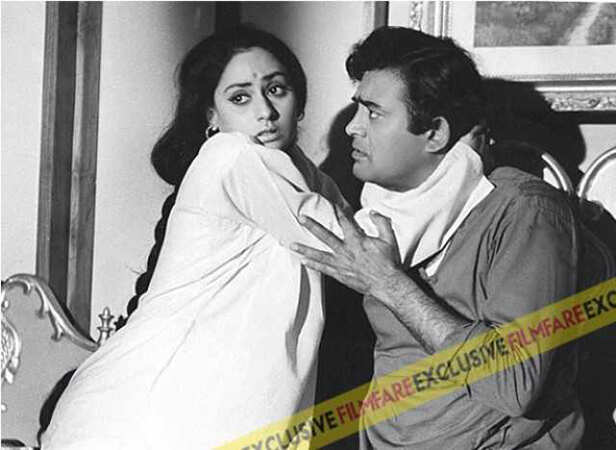
Anamika (1973)
Deceit, revenge and love! And lots of chemistry between Jaya and Haribhai (Sanjeev Kumar) in this romantic thriller by Raghunath Jalani. She was the impish Anamika to the reticent writer played by Sanjeev. And just when he begins to thaw to her advances, there’s her past to reckon with. From the fun-loving girlfriend in Logon na maro ise, to the flirtatious tease in Bahon mein chale aao (one of Lata Mangeshkar’s favourite numbers) and the indicted Anamika in Meri bheei bheegi si, Jaya brought in her own brand of spontaneity.
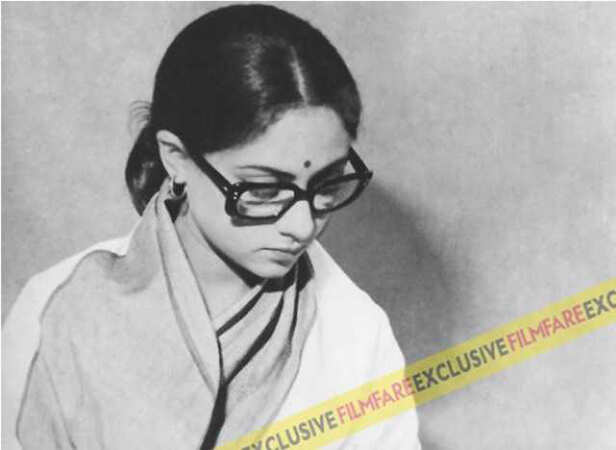
Kora Kagaz (1974)
The film directed by Anil Ganguly was a remake of a Bengali film Saat Pake Bandha (1963). The film traced Jaya’s maturity as an actor. From the dreamy undergraduate who’s infatuated by a professor and his idealism, to a wife who tries hard to hold her marriage together, to a disillusioned woman who makes solitude her companion, this was Jaya’s journey primarily. Even her looks changed through the phases, with the spectacled look flaunted on the film’s posters. Remarkable were the scenes when she tears her husband’s kurta in a fit of exasperation and when they meet after years in the waiting room at a railway station. Interestingly, the background song Mera jeevan kora kagaz, a Kishore Kumar superhit, was filmed on her. Gogi Anand’s Doosri Sita in the same year won her critical appreciation for a nuanced act.
Won the Filmfare Best Actress Award
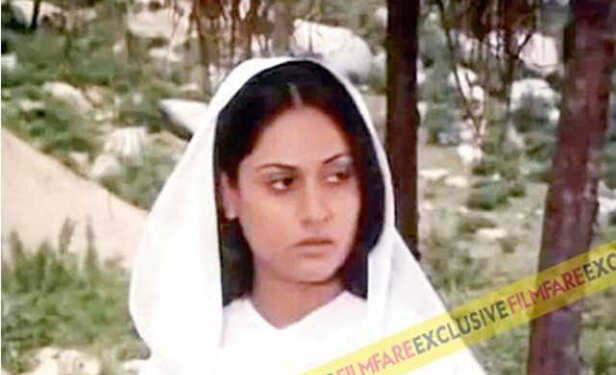
Sholay (1975)
Every character in Ramesh Sippy’s epic Sholay is memorable. For their dialogue, for their larger-than-life persona, for their obvious idiosyncrasies. But Jaya as Radha is remembered for her silence. The course of her character was summed between two Holis in the film. One when she as a bubbly girl ran along the tonga carrying her future father-in-law (Sanjeev Kumar as Thakur), chatting incessantly to him, more vibrant than the colours on her. And the other when she as a widow stands at the mandir steps, the village immersed in celebration, but her life swathed in white. Also, one of the most romantic scenes in Hindi cinema could be the one between Jai and Radha, which has her lighting the lamps and he, aware of her presence, plays the soulful tune on the mouth organ. Jaya was carrying her firstborn Shweta during Sholay
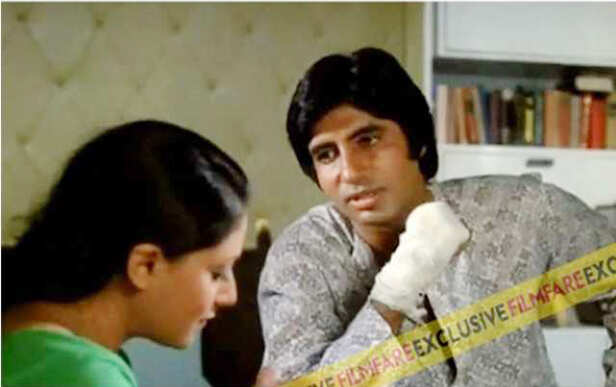
Mili (1975)
This was another Hrishikesh Mukherjee-Jaya and Amitabh Bachcahn classic. Similar to his earlier braveheart tale Anand, this had a deep romantic angle. The film had Jaya play the exuberant Mili, loved by family, neighbours and children, for the joy she infuses in their lives. It’s the same joie de vivre that at first offends and then charms a brooding, sensitive, alcoholic Shekhar (Amitabh Bachchan). Only to realise that she’s suffering from a terminal disease! Scenes to watch out for are when she chides a drunken Shekhar for his excesses, when Shekhar shares his sad past with her and she comforts him, when the two watch stars through the telescope at night. Also noteworthy is the bond she shares with her father (Ashok Kumar). Most poignant is the scene when she overhears him discussing her illness with her brother and pretends she’s heard nothing. The film had great music by SD Burman – Aye tum yaad mujhe, Badi sooni sooni hai, Maine kaha phoolon se.
Received a Filmfare nomination
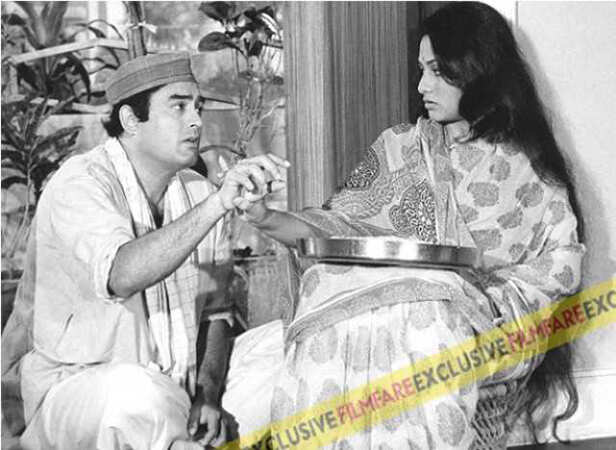
Nauker (1979)
Ismal Memon’s Nauker is widely remembered for its folksy number Pallo latke. More so because it was filmed on Jaya, who was never known to be an agile dancer. But the film, apart from the delightful number (composed by RD Burman), worked and how! Her simple portrayal of Geeta, a domestic help, who Amar (Sanjeev Kumar), a wealthy widower, falls in love with was endearing. Her bonding with Sanjeev was flawless as usual, with touches of humour and warmth. So also her ease with the child actor, complete with dolls and lullabies - Chandni re jhoom and Aaya na karo gu-diya. She seemed effortless cast in the milieu she knew best – the middle class.
Won the Filmfare Best Actress Award
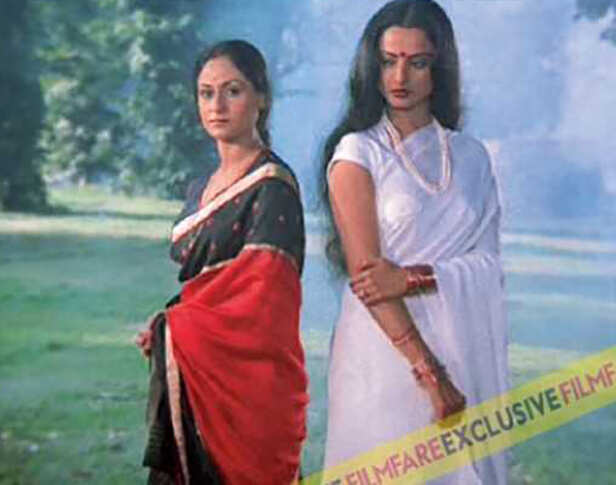
Silsila (1981)
This was a film that grabbed newsprint for more reasons than one. Firstly, it scrapped the original pairing of Smita Patil and Parveen Babi opposite Amitabh Bachchan to rope in Jaya and Rekha instead in a casting coup. The alleged real life triangle on screen in an extramarital tale by Yash Chopra was enough to escalate the curiosity around it. While Rekha walked away with all the gloss and passion, Jaya had to portray a character, which desisted from evoking sympathy, rather invited admiration. And dignity she did lend. As a wife who believes in the sanctity of her bond, never mind the intrusion in her fiefdom. Being a Yash Chopra film, there was a hint of glitz added to her persona. Hair blow dried straight, silk sarees, and pearls around her neck, she looked every bit a privileged wife. But to that she brought her subtlety. Memorable scenes – when she breaks down on hearing of her boyfriend’s (Shashi Kapoor) accident, when she watches her poet-husband (Amitabh Bachchan) reciting a verse for the ‘other woman’(Rekha as Chandni) on TV, when she watches him flirt with Chandni on Holi, when her husband tells her that he’s leaving her and she listens… only to break down after he’s gone. The film had great songs between Rekha-Amitabh. But there was a beautiful one with her and Shashi Kapoor – Sar se sarke sarki.
Received a Filmfare nomination
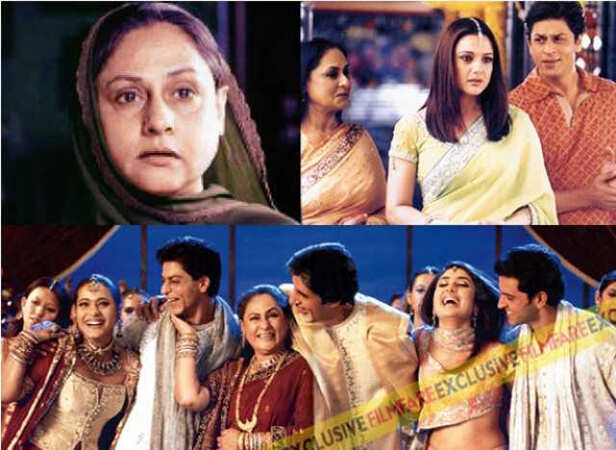
After a hiatus of almost 18 years, Jaya was seen in a spate of films essaying what she knows best – a mother!
Hazaar Chaurasi Ki Maa (1998)
Govind Nihalani’s Hazaar Chaurasi Ki Maa had her playing Sujata, a grief-stricken mother who learns about her son’s militant leanings and wants to adhere to his violent mission. The film won the National Film Award.
Fiza (2000)
Khalid Mohamed’s directorial debut had her playing a devout Muslim, Nishatbi, complete with burqa and soorma. Being a devoted mother to Fiza (Karisma Kapoor) and Aman (Hrithik Roshan), her character goes through severe turmoil when she realises her missing son’s turned a terrorist. While grief is the subtext of her role, she’s also a woman who can sneak into her neighbour’s house and try out some cosmetics or do an impromptu jig to a song. !
Won the Filmfare Best Supporting Actress Award
Kabhi Khushi Kabhie Gham (2001)
The role required her to don Manish Malhotra sarees, designer jewellery and even hazel contact lenses. But Jaya will be remembered more for playing Nandini Raichand, who eventually stands up to the autocratic husband for her adopted son. While her chemistry with husband Amitabh Bachchan was predictably good, it was her synergy with Shah Rukh Khan, her adopted son, that was heart-warming. Sepia-toned memories of a young SRK getting playful with her, her intuitive hearing of his footsteps, her cuddling up to him in moments of sadness. The defining moment? When she pays back her husband in his own words, ‘Jo kehdiya so kehdiya’!
Won the Filmfare Best Supporting Actress Award
Kal Ho Naa Ho (2003)
As the New York based Jennifer, she was Jaya with a difference! Slim and jeans clad with a pony tail tied high, she was urbane and upbeat, yet vulnerable. As a widow who had to hold her family of women – a nagging mother-in-law (Sushma Seth), a cynical daughter (Preity Zinta) and an unacknowledged step-daughter (Jhanak Shukla) together, was a tough act. Again her vibe with Aman (Shah Rukh Khan), who comes Messiah-like to relieve her woes, was touching.
Won the Filmfare Best Supporting Actress Award
Next Story